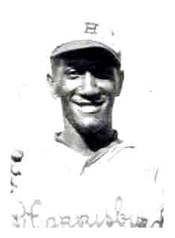

Clarence Jenkins
Nickname: Fats
Career: 1920-1940
Positions: of, manager
Teams: New York Lincoln Giants (1920, 1928, 1930), Atlantic City Bacharach Giants (1922, 1928-1929), Harrisburg Giants (1923-1927), Hilldale Daisies (1928), Baltimore Black Sox (1930), New York Harlem Stars (1931), Pittsburgh Crawfords (1932, 1938), New York Black Yankees (1932-1934, 1936-1938, 1940), Brooklyn Eagles (1935), Brooklyn Royal Giants (1939-1940), Toledo Crawfords (1939), Philadelphia Stars (1940)
Bats: Left
Throws: Left
Height: 5' 7'' Weight: 180
Born: January 19, 1898, New York, New York
Died: December 6, 1968, Philadelphia, Pennsylvania
A left-hander all the way, Jenkins had exceptional quickness and was a very fast man in the field and on the bases, especially from the batter's box to first base. A very smart player, he studied the art of baserunning and was an exceptional base stealer. At the plate he was a slap hitter with only average power but was a good contact hitter. He was a good fielder with a wide range and an average arm. A hustling, gifted, versatile athlete, in the off-season he was a member of the great Renaissance basketball team. Jenkins joined the team in 1924 and, although the smallest man on the team, he captained the squad for over a decade (1932-1942), with the team winning 88 straight games during the 1934-1935 season. Excelling in both sports, he was an asset to any team that was fortunate enough to acquire his services.
He began his professional baseball career with the 1920 New York Lincoln Giants. His skills and success on the diamond led him to manager Oscar Charleston's Harrisburg Giants in 1923, where he was the right fielder and lead-off hitter for the next five years, recording batting averages of .317, .315, .283, and .398 for the 1924-1927 seasons, until they dropped out of the Eastern Colored League. While at Harrisburg, he and George Fiall (another basketball star) were dubbed the "heavenly twins" by the press, but Fiall never enjoyed the measure of success on the diamond that Jenkins achieved.
After leaving Harrisburg, Jenkins settled with the Bacharach Giants for two years, where he continued his hot hitting, with averages of .379 and .365, the latter coming during the American Negro League's only year of existence, 1929. In the absence of a league in the East, in 1930 Jenkins rejoined the Lincoln Giants, who were playing as an independent ballclub in their last year of existence. With Jenkins contributing a .329 batting average, the Lincoln's proved to be one of the top teams in the East, dominating play most of the season before losing a late-season playoff for the eastern championship to the Homestead Grays. In 1931 he joined manager John Henry Lloyd's New York Harlem Stars, a team that replaced the Lincoln's and in turn was replaced by the New York Black Yankees the following season. With each of the New York- based teams he was the left fielder and lead-off batter and is credited with averages of .256 and .288.
In 1933 he was selected to the East squad for the inaugural East-West All Star game and earned his second appearance in the midseason classic in 1935, when he hit .321 during the regular season with the Brooklyn Eagles. He was back with the New York Black Yankees in 1936-1938 but had slowed a half step and moved from the leadoff spot to the heart of the order; although batting statistics from this period are incomplete, he is credited with a composite average of .266 for these years. He played for two more seasons with four teams before retiring from the diamond. Much of his twenty one year career was played in New York. He finished with a .334 lifetime batting average in black baseball.
Off the field, Jenkins enjoyed music, playing the piano and singing as a member of his team's quartet. A very frugal man, after his baseball career he was a successful businessman, opening a package store in the Bronx while also becoming a boxing referee in New York City.
Source: James A. Riley, The Biographical Encyclopedia of the Negro Baseball Leagues, New York: Carroll & Graf Publishers, Inc., 1994.

Clarence "Fats" Jenkins